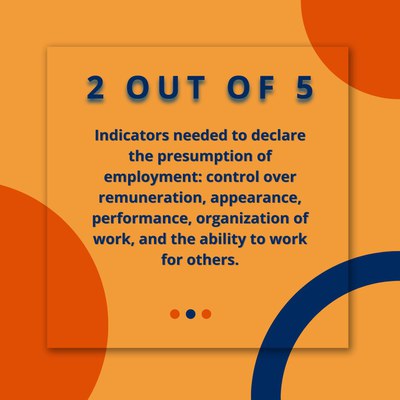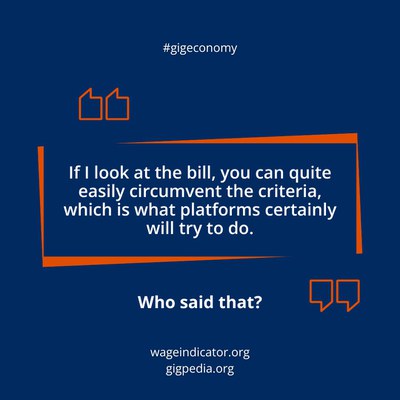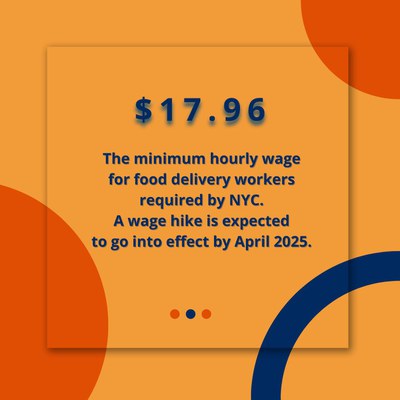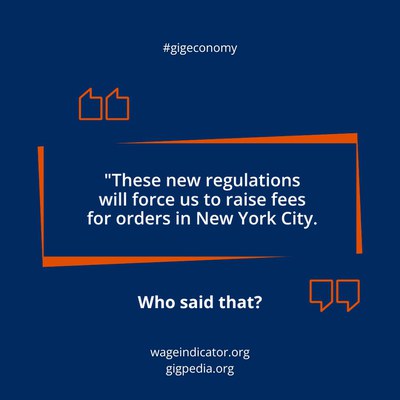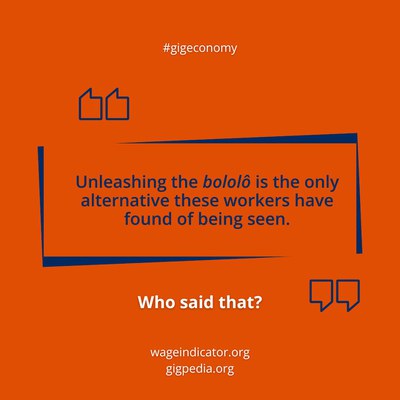
Dear reader,
Recently, the Turin Labour Court made a decision considered a "historical win" by the Italian media. In July, Foodinho/Glovo was ordered to establish an indefinite, full-time employment relationship with one of its riders.
This rider has now officially started working as a permanent employee and will enjoy a working time limit of 40 hours per week, with a gross monthly salary of 1,400 euros. Moreover, the court has acknowledged the entire shift when the rider is logged into the platform as work time.
Previously, only one other Italian rider had been recognized as having the right to an employment contract. However, on that occasion, the platform agreed to give an economic refund and didn’t let him keep the job, resulting in the rider eventually shifting to another occupation.
Will this Glovo rider’s case pave the way for gig workers to achieve better working conditions, or are there any issues left to be addressed? What’s the connection between this case and the “new worker model” promoted in Brazil?
Just Eat and a successful business model
To many experts, the latest Labour Court ruling paved the way for Italian gig workers to achieve economic stability and social protection.
According to May data, more than 2,500 Just Eat riders are estimated to have been hired under employment contracts nationwide.
Just Eat announced its plan to switch to standard labour contracts in 2020; then, in 2021, it applied a national collective labour agreement to its workforce, including holiday, sick pay, overtime pay, maternity and paternity leave, and hourly wages.
However, Just Eat stands out as a unique case in the Italian landscape. The Uber Eats food delivery service left Italy after seven years and is now tackling a Milan court's ruling, according to which the decision to lay off 4,000 food-delivery riders as it closed down its operations was illegal.
Gorillas fired all the staff in 2022, and so did Getir a year later to focus on more profitable markets.
Nonetheless, the food delivery market, which exploded ten years ago, hasn’t collapsed yet and is still worth 1.8 billion euros. Just Eat's success continues, and the company plans to expand further into other cities.
What we are missing
Even though Just Eat's business may be working, many issues must be addressed.
Assodelivery, the association representing major platform companies, and the union Ugl agreed in 2020 to define the status of riders. Still, the Ministry of Labour rejected it, asking for more trade unions to be involved and putting down the pay model based on the delivery number, not an hourly wage. Just Eat itself left the association after the agreement was signed as a sign of protest.
Since then, there has been no political intervention to address this issue.
The absence of regulation is the reason why business mergers become complicated. With the news of the closure of the Mymenu platform and the transfer of the customer and restaurant package to Just Eat, many rejoiced at the opportunity for Mymenu delivery workers to be “hired” by Just Eat.
Two meetings have taken place so far on 15 and 29 November between the company and the unions, and MyMenu has stated that “the riders will have the opportunity to try to relocate to Just Eat”.
However, the agreement signed between MyMenu and Just Eat does not oblige the latter to hire MyMenu riders, as the deal is not binding. This means that the relocation of workers is still being determined.
Interestingly, the union representing Glovo's rider before the Turin Court in July also stated that “it is necessary to find employment alternatives for all those involved”.
This statement is much more in line with reality: the issue is not about fighting for everyone to have a subordinate contract, but rather about ensuring decent working conditions for the most vulnerable and precarious workers.
Riders are micro-entrepreneurs (or they should be)
The Brazilian Federal Supreme Court, commonly known as STF, takes the same point of view. It has overturned multiple rulings by labour courts that admitted employment relationships between app platforms and their workers.
In October, the STF annulled the Superior Labor Court's decision recognizing a Rappi rider's subordinate status. Recently, the STF also overturned a Regional Labour Court ruling that established a driver's employment relationship with Cabify.
It recognizes the validity of outsourcing activities and praises the opportunity the gig economy gives workers to increase their income and freedom.
Minister of the STF Alexandre de Moraes said, “Drivers have the freedom to accept the rides they want, make their own schedules, and have other platforms to work on. They are micro-entrepreneurs, and this is a new way of working in Brazil and worldwide. This is an evolution and could face some resistance”.
It resembles the UK Supreme Court’s ruling about the substitution clause and why Deliveroo riders cannot be considered employees.
A new model (but it is not yet clear which one)
The ideas of a "new way of working" or a "new worker model" are still being discussed, but what this is all about needs to be clarified. Until then, the work of the riders will remain on hold.
Meanwhile, rumours about Uber’s departure from some Brazilian towns have become more than rumours among millions of Brazilians who use the app for transportation or work purposes.
Like in Argentina, Uber is a point of attention for local governments. It’s a common opinion that platforms create opportunities but undermine workers' rights.
Besides, the absence of any legislative intervention to frame the innovation causes controversies. The Consolidation of Labor Laws, which governs labour relations in Brazil, prescribes that “an employment relationship exists when a natural person provides labour with personality, habituality, onerousness, subordination, and alterity.” On the other hand, most cases against Uber and Cabify have favoured platforms, with only a small portion recognising the existence of an employment relationship.
The reality is that, in addition to those who make a living from Uber, some rely solely on this work to make ends meet.
The question arises: should they be treated differently? This is a significant issue, particularly in light of a recent survey showing that nine out of ten workers approve of new rights as long as they don't interfere with flexibility.
Have a nice day,
The WageIndicator Gig team
DID YOU KNOW?
WageIndicator has developed the Living Tariff tool in partnership with GIZ, the German Development Cooperation.
Workers can use the tool to calculate and understand what they're making on their platforms and how much they need to earn.
The Living Tariff tool is being launched first in Pakistan, Kenya, and Indonesia.
If you want to learn more, feel free to contact us anytime.
Write to Paulien Osse (paulienosse@wageindicator.org) and Pooja Gianchandani (pooja.gianchandani@giz.de)


WHAT’S NEW ON GIGPEDIA
- Magalí Gurman (Glovo): 'The flexibility of the platform economy does not exclude good working conditions'
Glovo riders do not all get employment contracts but are covered by the Couriers Pledge in 21 countries. The company promises delivery workers safety, community, equality, and a fair income. How does it work? - Yes, We Do Resist: The Story of Women Worker’s Struggles and Resistance at Urban Company
Urban Company has many women workers resisting the platform's unfair practices. WhatsApp groups emerged as a vital instrument for struggling
Breaking news!
On December 13, 2023, EU legislators struck a provisional deal that could classify some workers as employees.
What is the deal about?
- A platform that meets at least 2 out of 5 indicators will be deemed an “employer”. However, member states may add further indicators to this list as a matter of national law.
- The presumption can be triggered by the worker or their representatives. This presumption can be rebutted if the platform proves that the contractual relationship is not employment.
- Algorithms used to assign jobs to gig workers must also be overseen by humans.
- The agreed text will have to be adopted by both Parliament and Council to become law. Next, it still needs to be ratified by lawmakers and member states, which will have two years to transpose it into their local laws.
- It’s an open question of how many of them will be reclassified. Platforms could change their model to avoid the indicators. Moreover, nothing in the directive prevents platforms from appealing the re-classification after the labour inspection has enforced it. This loophole can make the process extremely slow and not bearable by workers.

Brazil - Many customers are proven to abuse drivers with physical threats and racist attacks. Delivery workers across Brazil are protesting by revving their engines and making noise.
Lebanon - In an effort to understand if the platform economy might offer a solution to the precarious stability, Fairwork assessed working conditions in six platforms operating in Lebanon across two sectors, ride-hailing and food delivery; however, none of them provided verifiable evidence that satisfied fair work principles.
Spain - The complaint filed by riders and drivers against Glovo for using false self-employed workers will be investigated at the National Court.
UK - Uber has invited drivers for London’s black cabs to offer rides on its application in the latest attempt to heal a contentious rift between the company and the city’s signature taxi service.
Did you know? The number of cabs in London has now doubled since the arrival of Uber over a decade ago, and the US platform plans to gain more traffic on its app. However, according to the experts, the business will always struggle to make money.
US - Delivery workers in New York City protested against companies appealing the 20-dollar minimum wage approved by the New York City Council.

Canada - Uber filed an injunction application with the Ontario Superior Court of Justice, alleging that a cap on the number of private transportation company licences in the city is illegal.

Argentina
- Taxi drivers asked legislators to deal with the project of an anti-Uber law that will essentially end Uber's services in Catamarca. They are now losing customers due to the platform business.
- PedidosYa is accused of defrauding the State and could face a million-dollar penalty. It has been caught importing exchange goods as fixed assets, thus taking advantage of tax exemptions in VAT and Profits.
Brazil - During negotiations, transport applications proposed giving social security benefits to their workers but wanted to charge the customers for it. The Minister of Labour, Luiz Marinho, criticized this, saying that "companies don’t want to commit." No agreement was reached regarding the delivery platforms.
Finland - The Professional Union of Service Workers (Pam) and the food delivery company Wolt have started negotiations to achieve precise and commonly understood rules for couriers' work. The trade union aims to bring self-employed workers under the Finnish collective bargaining system, regardless of their status.
India - Congress leader Rahul Gandhi interacted with auto drivers, gig workers, and sanitary workers in Hyderabad and promised to enact a law in Telangana in line with Rajasthan’s Gig Workers Act, 2023.
Did you know? The Japanese government finalized a plan to allow drivers with a standard license to offer taxi services using their own vehicles to address a nationwide shortage of taxi drivers. Meanwhile, it has postponed deciding on whether to lift a ban on ride-hailing services.
US
- Wisconsin Governor Tony Evers signed Senate Bill 290 into law, which requires better regulation of food-delivery apps. Among the measures, workers will be required to know basic food safety principles.
- After New York City passed the new minimum wage law, food delivery platforms eliminated the tipping prompt on the checkout page and introduced a new service fee for each transaction. Customers retain the option to add a tip after the delivery.

Argentina
- Cabify is attempting to recruit drivers and vehicles in Bariloche to begin its disembarkation.
- Uber keeps expanding its motor service across the country. Thanks to Flash Moto, it can ensure the delivery of small packages.
Bangladesh - Foodpanda has pledged to stay long-term in Bangladesh despite incurring losses of 25 million in 2022.
Did you know? Pathao, Bangladesh's leading digital services company, is awaiting a licence to set up a digital bank.
Brazil - According to research by Fipe, iFood had an impact of 97 billion reais in gross production value and generated 873,000 jobs in 2022. This was 0.53 percent of Brazil's economy.
Canada - Uber Eats announced it’s expanding into 50 small cities and towns across Canada by the end of this year, including 10 in Ontario.
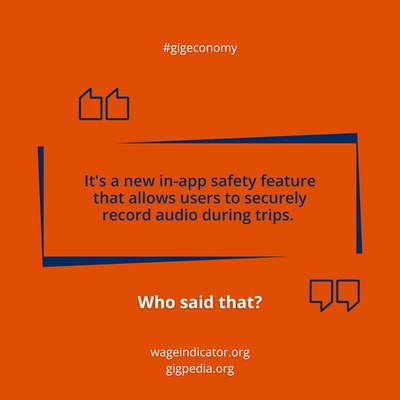 India
India
- Uber launched “Uber green” services in Karnataka's capital, Bengaluru. Users can now book eco-friendly, sustainable rides through electric vehicles.
- Uber announced a first-ever system wherein riders of aggregator cabs will be equipped with an app facility to record conversations of drivers who misbehave or are arrogant.
- Bike taxi aggregator Rapido announced its strategic entry into the cab business - a space currently dominated by two major players - Ola and Uber.
South Africa - Before submitting a ride request, new Bolt customers will now need to take a clear selfie to verify their identity in addition to the safety precautions already in place.
US -To help manage the holiday shopping rush, Amazon is using artificial intelligence to offer customers even faster deliveries.

Australia - After being hit and abused, an Uber driver had his account blocked despite a 4.91 rating, simply for asking them for help while reporting the incident for his safety.
France - Delivery drivers working for Uber Eats, Deliveroo, and Stuart protested against their precariousness and pay systems across France. Uber Eats introduced a new pricing at the beginning of November.
Italy - Deliveroo and Glovo riders went on strike in Verona while waiting for a dialogue to start on the implementation of relevant contractual regulations.
Spain - Amazon Delivery workers were urged to walk out to demand better pay and working conditions on Cyber Monday, a discount day where retailers aim to boost Christmas gift buying.
Report: An international investigation shed light on the health and safety issues delivery workers face in Bilbao. Most of them are undocumented migrants who rent their accounts from other riders and don’t have the legal right to be covered by insurance.

